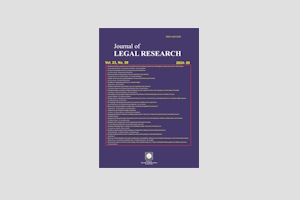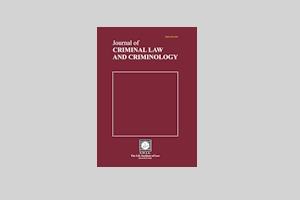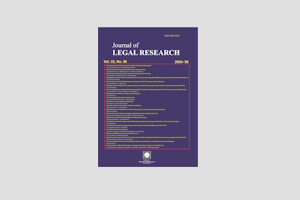Journal of
LEGAL RESEARCH
Number 30
Vol. XV ● No. 2
Autumn 2016 – Winter 2017
Managing Editor: Vahid Eshtiagh
Editor-in-Chief: Seyyed Ghasem Zamani
CONTENTS
Articles
The Commercial Custom Rules in International Trade, Interaction between CISG & Incoterms Rules
Dr. Mahmood Bagheri & Soroush Rostamzad Asli & Naser Azizi
Systems of Regulation of Advertising Aimed at Children in Television
Dr. Bagher Ansari & Manijeh Hashemian
Reflections on Dissolution of International Organizations
Dr. Mansour Jabbari & Masoud Ahsannejad
European Union’s Regulations on the Approximation of Nations and the Achievement of European Federalism (With a Proposal for Iran)
Seyed Hossein Tabatabaei
Modern Criminology and Relationship between Crimes
Dr.Alireza Milani & Mohammad Hajighasemi Ardebili
Protection of Children in Armed Conflicts in the Context of International Instruments
Armin Talaat & Mohammad Ahangar Asil
Human Rights Council against the National Politics of States: Some Remarks on the Case of North Korea
Aramesh Shahbazi & Samsam Avazpoor
Comparing between Limitations of Issuing Notarize Acts and Secure Electronic Documents (The US, French and Iranian Rules)
Abbas Karimi & Amir Sepahi
The Inventive Step Requirement in Iranian Patent System
Hamed Najafi & Mahsa Madani
Myanmar Crisis in the Mirror of the Human Rights Council
Marziye Ghalandari
A Study of Incomplete Crimes in Iran Penal Law
Alireza Rahmaninaimabadi
Articles
The Commercial Custom Rules in International Trade, Interaction between CISG & Incoterms Rules
Dr. Mahmood Bagheri
Associate Professor at Law and Political Science Faculty, University of Tehran,
Attorney at Law
&
Soroush Rostamzad Asli
Ph.D. Candidate in Private Law, Shiraz University, Legal Researcher,
&
Naser Azizi
Ph.D. in International Law, Assistant Prosecutor in Tehran Public and Revolutionary
Prosecution
Abstract:
United Nations Convention on the International Sale of Goods provide as default rules. Article 6 of convention gives right to change or dismiss the convention rule to the parties. Consequently, the parties can perform articles 66-70 of convention in several kinds, they can exclude perform some rules, or exclude their effects, in this situation party express their agreement. They can perform their agreement in regard to article 6 of convention, but the question is: where this amendment result is excluding all convention rules about risk, or exclude some rules effects?
When Party agreements amendment convention rule, they can agree that international custom (so incoterms rules) perform. The next problem is: if the party doesn’t expressly agreed about performance of incoterms rules; is it Possible to perform it as part of party’s contracts? In this article we consider the effects of party about substituting convention rule with incoterms rule and at the end clear that courts know incoterms as parts of agreement when party express or don’t express it.
Keywords: United Nations Convention on the International Sale of Goods, Commercial custom, Incoterms, International trade.
Systems of Regulation of Advertising Aimed at Children in Television
Dr. Bagher Ansari
Associate professor of Law, Shahid Beheshti University
&
Manijeh Hashemian
MA. in Communications Law. Allameh Tabataba’i University
Abstract:
The Children are honest, credulous and vulnerable. These characters have been making them as one of the best baits for commercial advertising. In addition to their purchasing power from their pocket proceeds, they also have a significant effect on their family’s purchases. Also, they provide the future market of a product. This capability led to market of selling products and services to children has become one of the best-selling markets and thus, children are excessively addressed to commercial advertising. For protecting children from these adverse effects of commercial advertising, this is the question that which methods exist for children’s advertising regulation? In the other words, who should regulate the advertising aimed at children and how? Advertising industry? Government? Or both of them? These triple types of regulation are: self-regulation, state regulation and co-regulation. This paper studies these types of regulations in various countries and in the light of the results from this study, examines the situation of regulation of advertising aimed at children in Iran.
Keywords: Regulation, Commercial advertising, Television, Child.
Reflections on Dissolution of International Organizations
Dr. Mansour Jabbari
Professor of International Law, Allameh Tabataba’i University
&
Masoud Ahsannejad
LLM at International Law, Allameh Tabataba’i University
Abstract:
There are many situations that International Organizations confront with during their existence. Dissolution of IOs and termination of their international legal personality is considered to be one of the most important parts of their lives. The role of establishing treaties in the continuance of IOs’ life as their constitution beside the role of States in their creation on one hand, and the autonomy and international legal personality of IOs on the other, has raised different approaches on the basis of dissolution of IOs.
Some has come to the conclusion that the will of States is the base of dissolution of IOs, while others believe IOs are the only competent power to dissolve themselves. In this article we have tried to reach a thorough conclusion on the issue considering the nature of IOs and the methods available for their dissolution.
Keywords: International Organizations, International Legal Personality, Basis of Dissolution, Ways of Dissolution
European Union’s Regulations on the Approximation of Nations and the Achievement of European Federalism (With a Proposal for Iran)
Seyed Hossein Tabatabaei
Ph.D. of International Law from the University of Nice Sophia Antipolis
(Institut du droit de la paix et du developpement)
Abstract:
After the economic crisis in Europe, some experts believe that the solution is the dissolution of the Union and some others believe by contrast, in strengthening the Union as a solution. This article will explain two types of regulations and policies to strengthen the Union with the approach of approximation of cultures and nations: first, policies on the culture and education. Secondly, regional regulations (with an emphasis on financial cooperation). The EU objective of these rules and policies is strengthening the unity of the Union.
Keywords: European Union, Federalism, Cultural policy, Education policies, Regional regulations
Modern Criminology and Relationship between Crimes
Dr.Alireza Milani
Faculty member of Islamic Azad University, Eslam Shahr branch
&
Mohammad Hajighasemi Ardebili
MA. in Criminal Law and Criminology Islamic Azad University Science and Research, Kermanshah Branch
Abstract:
There is a wide and variety relationship between crimes. But many crimes are dependent to the others) dependent crimes (so that they are not able to exist without them. This dependency may be substantive or subordinate which are created by offenders decisions and other circumstances .there are some crimes that are independents but very crucial in existence of other crimes. Considering to these relations and reviewing the social constructions and making comparison between the two shows us that there are many structures between crimes that are very similar to our social constructions and meanwhile some differences can be seen .it seems these social structures are reflections of the society in which crimes are committed and this issues gives social character to crimes .this aspect is less noted yet and may create a different view to the offences.
Keywords: Independent crimes, Dependent crimes, Community, Social structures.
Protection of Children in Armed Conflicts in the context of International Instruments
Armin Talaat
Candidate of Ph.D. in International Law, Allameh Tabataba’i University
&
Mohammad Ahangar Asil
LLM – International Law, Allameh Tabataba’i University
Abstract:
Children are the true symbols of defenselessness in armed conflicts, to whom States have paid specific attention. International society has taken remarkable measures to protect the rights of children in armed conflicts, both on international and regional scales. Some of the related international instruments are: Declaration of the Rights of the Children (1959), Convention on the Rights of Children (1989), Geneva Convention IV Relative to the Protection of Civilian Persons in Time of War (1949), 1977 Protocols I and II additional to the Geneva Conventions of 1949, and the Additional Protocol to the Convention on the Rights of Children, adopted in 2000. There are also regional instruments, including African Charter on the Rights and Welfare of the Child (1990), European Social Charter (1996), African Union Convention for the Protection and Assistance of Internally Displaced Persons in Africa (2009), and American Convention on Human Rights (1969). The measures taken reveal the serious vulnerability of children in armed conflicts. A few States, especially African States, still do not honor their obligations to protect children. This article tries to stress the importance of the rights of children by investigating related international and regional instruments. Regarding the numerous instruments protective of the rights of children in armed conflicts, it can be concluded that the rights of children with respect to armed conflicts have been accepted worldwide, and therefore have entered into international customary law.
Keywords: Armed conflicts, Rights of the children, International and regional instruments, International society.
Human Rights Council against the National Politics of States: Some Remarks on the Case of North Korea
Aramesh Shahbazi
Assistant Professor of International Law Allameh Tabataba’i University
&
Samsam Avazpoor
LLM Student of International Law Tarbiat Modares University
Abstract:
International community has recently faced with some modern forms of challenges between application of national politics and respect to evolving rules of international law. In this situation many states, especially in the context of international human rights law choose to escape from international obligation in order to advance their national policy. North Korea’s human rights record is among the worst in the world and has been widely condemned globally, especially by Amnesty International, Human Rights Watch, the European Union and the United Nations. The recent declarations of the human rights council which clearly condemned the violation of human rights in North Korea and further repeated violations by this country could be proved the fact that still the human rights’ values are as weak as being able to enforce the states to apply them.
Keywords: North Korea, Human rights Council, Human rights grave breach, National Politics, International Covenant on civil and Political Rights.
Comparing between Limitations of Issuing Notarize Acts and Secure Electronic Documents (The US, French and Iranian Rules)
Abbas Karimi
Professor at University of Tehran
&
Amir Sepahi
Ph.D. Student at the Islamic Azad University Central Tehran Branch
Abstract:
After long study in Limitations of Issuing Notarize Acts and Limitations of Secure Electronic Documents, it is obvious that the limitations of issuing secure electronic documents are more than limitations of issuing notarize acts. Because generally there are some special limitations for issuing electronic documents, moreover many limitations of issuing notarize acts transmitted to the secure electronic documents because they are rooted in public policy and ethics. Furthermore there are some limitations for notaries as public officer that they transmitted to certification authorities (CAs) because they are public officer too, thus CAs cannot issue digital certificates so on secure electronic documents cannot be issued.
Keywords: Public limitations of issuing notarize act, Special limitations of issuing notarize act, Public limitations of issuing secure electronic document, Special limitations of issuing secure electronic document.
The Inventive Step Requirement in Iranian Patent System
Hamed Najafi
Ph.D. Student of Private Law in Tarbiat Modares University and Researcher of
Comparative Law Institute of Tehran University
&
Mahsa Madani
Ph.D. Student of Private Law
Abstract:
The inventive step requirement beside the two requirements of The novelty and industrial application, is one of the basic requirement of patents. This requirement means that, an invention with regard to the prior art does not obvious for the person who has ordinary skill in the art. Challenges contrary to this requirement, create the motive in us to essay the present article .such a challenge is seen both legislatively and executively. For this reason, in the present article, at first, present the concept and necessity, and then we would study the history of it in the Iranian law, for At the end, we would study and analyze the legal place and the subject of assessment of the inventive step requirement in classic and modern (nucleic acid molecules) inventions, introduce the existent defects and offer the legislative and executive appropriate proposals.
Keywords: Inventive step requirement, Assessment, Classic inventions, Nucleic acid molecules, Iranian law
Myanmar Crisis in the Mirror of the Human Rights Council
Marziye Ghalandari
M.A. in International Law, Allameh Tabataba’i University
Abstract:
The phenomenon of internationalization of Human Rights starts by establishing the human Rights Commission along with Security Council and General Assembly to maintenance of International peace and security and respect to human Rights according to the violation of human rights, and Culminated with the replacement by the Human Rights council.
Myanmar Crisis and human Rights violation in it which starts 2012 is a case of human Rights violation that needs the Human Rights Council’s attention to stopping the Genocide there.
Keywords: Human Rights Commission, Human Rights council, Human Rights violation in Myanmar, Myanmar Crisis, Institutions to protect human rights.
A Study of Incomplete Crimes in Iran Penal Law
Alireza Rahmaninaimabadi
M.A. in Criminal Law and Criminology Isfahan University
Abstract:
One of the existing divisions for crime in Iran penal law is complete (finished) and incomplete (unfinished) crimes. Unlike in complete crimes which the doer finishes the criminal act and fulfills his purpose, in incomplete crimes the doer doesn’t reach his goal as he desires. Attempting crime is divided to attempting the impossible or attempting the abortive based on the doer running offence after criminal intent and preparation but encountered an external factor, or after criminal intent and preparation run offence and completed it but because of some adventitious factors (relative or absolute factors) he fails to run the crime.
In this research we are about to explain the elements of these crimes and their position so that we can recognize them through a proper model.
Keywords: Attempting crime, to attempt running the crime, to attempt operating the crime, Abortive crime, Impossible crime.





